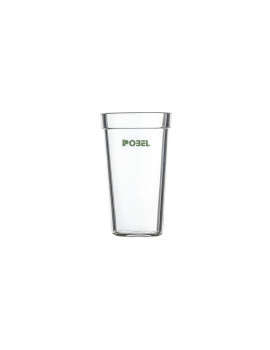BEAKER
Beakers
Beakers are essential containers in the laboratory. With a simple structure, these beakers are used in multiple scientific and educational procedures, being key to contain, mix and heat substances. Below, we explain what a beaker is, the types that exist and their essential characteristics.
What is a beaker?
A beaker is a glass or plastic container, usually cylindrical and with a pouring spout, designed to facilitate the handling of liquids in laboratory environments. Mostly made of borosilicate glass or tough polymers, beakers withstand temperature changes and chemical resistance, making them ideal for mixing, heating and storing substances. In addition, they usually have an approximate scale on their surface to measure volumes as a guide.
Types of beakers
Glass beakers
Glass beakers, usually made of borosilicate glass, are notable for their heat resistance, which makes them suitable for work requiring high temperatures or sudden thermal changes. Their surface is transparent, allowing reactions and changes in the contents to be clearly observed. These beakers are the preferred choice for advanced chemistry experiments and are reusable, easy to clean and compatible with different types of chemicals.
Plastic beakers
This type of beaker is made of plastic materials such as polypropylene, which makes them lightweight and inexpensive. Although they cannot withstand high temperatures like glass beakers, plastic beakers are ideal for cold work or experiments that do not require heat. In addition, they are unbreakable and resistant to certain acids and bases, making them useful in educational environments or when seeking to minimize the risk of accidents.
Main characteristics of a beaker
Beakers have certain features that make them indispensable in the laboratory:
- Pouring spout: facilitates the transfer of liquids without risk of spillage.
- Thermal resistance: in the case of borosilicate glass beakers, they can withstand high temperatures, while plastic beakers are suitable for low-temperature work.
- Measuring scale: most have markings on the surface, although these are approximate and are no substitute for an exact volumetric material.
- Different capacities: beakers are available in a variety of sizes, from 10 ml to several liters, adapting to the needs of each experiment.
Uses of beakers in the laboratory
Beakers are versatile and have numerous uses in the laboratory. They are used in chemistry, biology and physics experiments due to their practical and rugged design. Some of their main applications include:
- Preparation of solutions: beakers allow chemical compounds to be mixed in controlled amounts. Although they are not exact volumetric vessels, they are useful for initial mixtures.
- Heating liquids: glass beakers, especially borosilicate beakers, can be placed directly on heating plates, making them ideal tools for experiments requiring a temperature rise.
- Controlled chemical reactions: in the laboratory, beakers allow real-time observation of chemical reactions, especially those that produce precipitates or color changes.
- Temporary storage of substances: beakers are often used to contain liquids or other substances during the experimental process, facilitating their handling and transfer.
Choosing the right beaker for your laboratory
When selecting a beaker, it is important to consider the type of experiment to be performed and the conditions under which it will be used. Here are some key factors:
- Material: If your experiment involves heat or corrosive chemicals, choose borosilicate glass beakers for their strength. For cold work or where safety is a priority, plastic beakers are ideal.
- Capacity: Determine the approximate amount of liquid you will use and select a beaker that will give you enough space without filling it to the brim. Capacities range from 10 ml for precision work to multi-liter beakers for large mixtures.
- Transparency: glass beakers are completely transparent, which is useful for observing reactions or color changes. Plastic beakers, on the other hand, can be opaque or semi-transparent.
- Resistance to chemicals: make sure that the glass you choose is compatible with the chemicals you will be handling. Borosilicate glass is generally resistant to most acids and bases, while certain plastics may not be suitable for all substances.
Buy quality beakers at Pobel
At Pobel, we offer a selection of high-quality beakers suitable for all types of laboratories and experimental needs. Browse our options and find the perfect beakers for your experiments.











